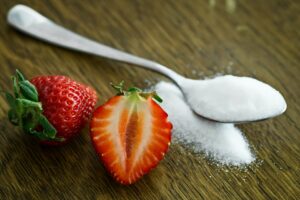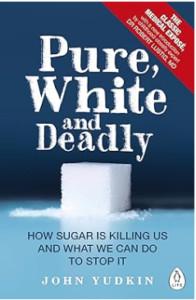Sugar, sweet and yummy . Sugar sweet in taste and bitter in health.

The mere mention of sugar triggers the mind to paint vivid scenes of luscious, enticing chocolates, sparkling drinks, and a plethora of other indulgent delights. More. Can you feel the allure? If only the nutritional value matched the exquisite taste of sugar. I am sure a lot of you will agree with me on this, particularly when you have the kind of sweet tooth I have.
Individuals frequently indulge in chocolates, cakes, or candies not out of hunger but due to irresistible visual appeal. It’s not about satisfying hunger, it’s about deriving pleasure and indulging in that extra dose of dopamine (the happy chemical).
Two Molecules of Sugar

Sugar consists of two molecules: glucose and fructose. Upon food consumption, the body manages these two molecules differently. Glucose circulates through the bloodstream providing nourishment to our cells, while fructose takes a direct route to the liver. Consistent consumption of sugary products results in an excess of fructose compelling the liver to convert it into fat, ultimately contributing to the development of the fatty liver.
According to John Yudkins, the author of ‘Pure White And Deadly’, “There is no physiological requirement for sugar, all human nutritional needs can be met in full without having a single spoon of white, brown or raw sugar, on its own or in any food or drink.”

A few years ago sugar was primarily blamed for obesity, with the notion that excessive sugar consumption could lead to weight gain. (Read previous article on weight loss, https://healthgoalsforall.com/preconceived-notions-about-weight-loss/https://healthgoalsforall.com/preconceived-notions-about-weight-loss/ However, recent research has revealed that sugar is implicated in a broader spectrum of health issues known as Metabolic Syndrome. This syndrome encompasses conditions such as diabetes, hypertension, lipid abnormalities, cardiovascular disease, and non-alcoholic fatty liver disease.

I ponder whether we can entirely blame ourselves for the overconsumption of sugar in our diets given the ready availability of these tempting sugary foods. In our fast-paced modern lives, there is a significant reliance on processed foods: boxed cereals, bread, frozen meals, pasta, and juices that have replaced whole foods.

We purchase these extensively processed foods and beverages under the illusion of opting for healthy snacks, often neglecting to consider the sugar content. For instance, not many are aware that 4 grams of sugar is equivalent to 1 tablespoon. Personally, it wasn’t until I delved into the study of nutrition that I became aware of this as I hadn’t paid attention before. If a box of bars labels itself as a low-fat healthy protein bar, there’s a natural assumption that it is a healthy choice.
Adding to the complexity, sugar goes by about 60 other names. While it’s challenging to recall them all (some include sucrose, dextrose, lactose, maltose, galactose, fructose, and numerous others), a helpful hint is to pay attention to words ending in “ose” when scanning ingredient lists.

Overcoming sugar addiction is a formidable challenge Dr. Robert Lusting, The BITTER TRUTH About Sugar & How It Causes INFLAMMATION | Robert Lustig states that sugar addiction is eight times more potent than cocaine addiction. As I endeavored to curb my sugar cravings, the struggle felt significant. Abrupt cessation isn’t a viable option. Instead, the key lies in making gradual changes to our daily routines.
Here are some recommendations for diminishing sugar cravings and breaking free from the addiction:
Read the previous Article for more information on forming health habits, /https://healthgoalsforall.com/2024-health-goals-2/
- Transition to a diet focused on whole foods such as vegetables, fruits, legumes, nuts, and seeds. These unprocessed foods inherently contain no added sugars, unlike many processed foods that often have high sugar.

2. Avoid consuming calories through beverages and opt for whole fruits instead of fruit juices. Fruits contain fiber, which promotes a quicker feeling of fullness compared to drinking a glass of juice
3. Eat more protein which helps stabilize your blood sugar. Try to eat protein in every meal so that your blood sugar levels are stable and you don’t crave sugar.
 4. Eating more whole fat like avocados keeps you full for longer periods.
4. Eating more whole fat like avocados keeps you full for longer periods.
5. Drink 8 to 10 glasses of water. When the body is dehydrated it demands sugar.
6. Don’t fall into the trap of natural sugars in the process of cutting refined sugar. Some people tend to become addicted to natural sugar like maple syrup, honey, raw sugar, etc. These forms of sugar are denser and would lead to weight gain.

7. Low availability is key since if we have a sweet craving and can’t find anything sweet at home, the craving will settle down by itself.
8. Avoid eating sugar when you are stressed as stress eating will lead you to overeat.
9. Keep healthy food options available. If you get hunger pangs and there’s nothing healthy available, you usually tend to eat sweet stuff.
10. Make little changes every day, don’t try to cut sugar out of your life overnight. Instead of sugary drinks go for water or something unsweetened. Instead of the chocolate bar go for carrots. These small achievements will lead to a bigger victory. Remember to pat yourself on the back with every victory.
Disclaimer: This is not physicians opinion all this information is derived from personal research.

Great article! Very insightful
Pingback: Simple Ways To Achieve Youthful Radiant Skin -
Pingback: No Gut No Glory-Leaky Gut
Pingback: Whats On Your Plate Carbs, Fats and Proteins macronutrients